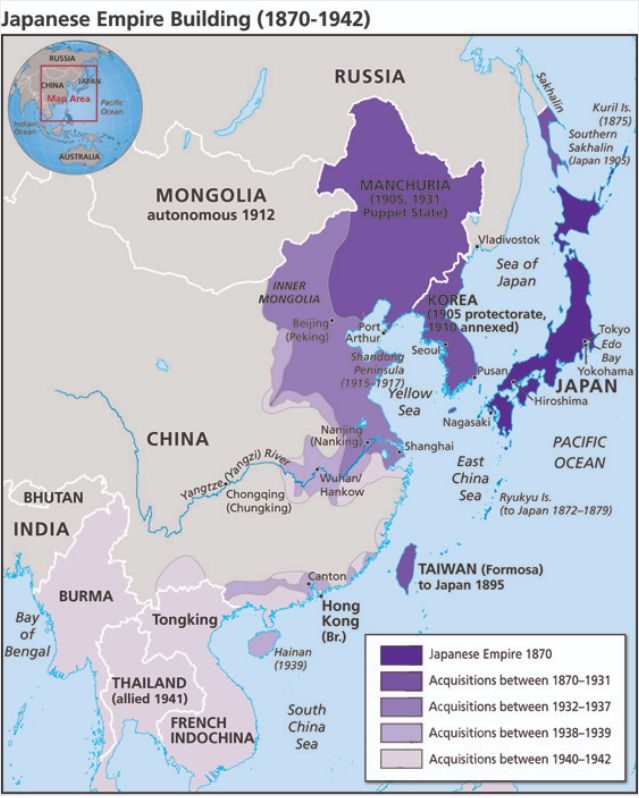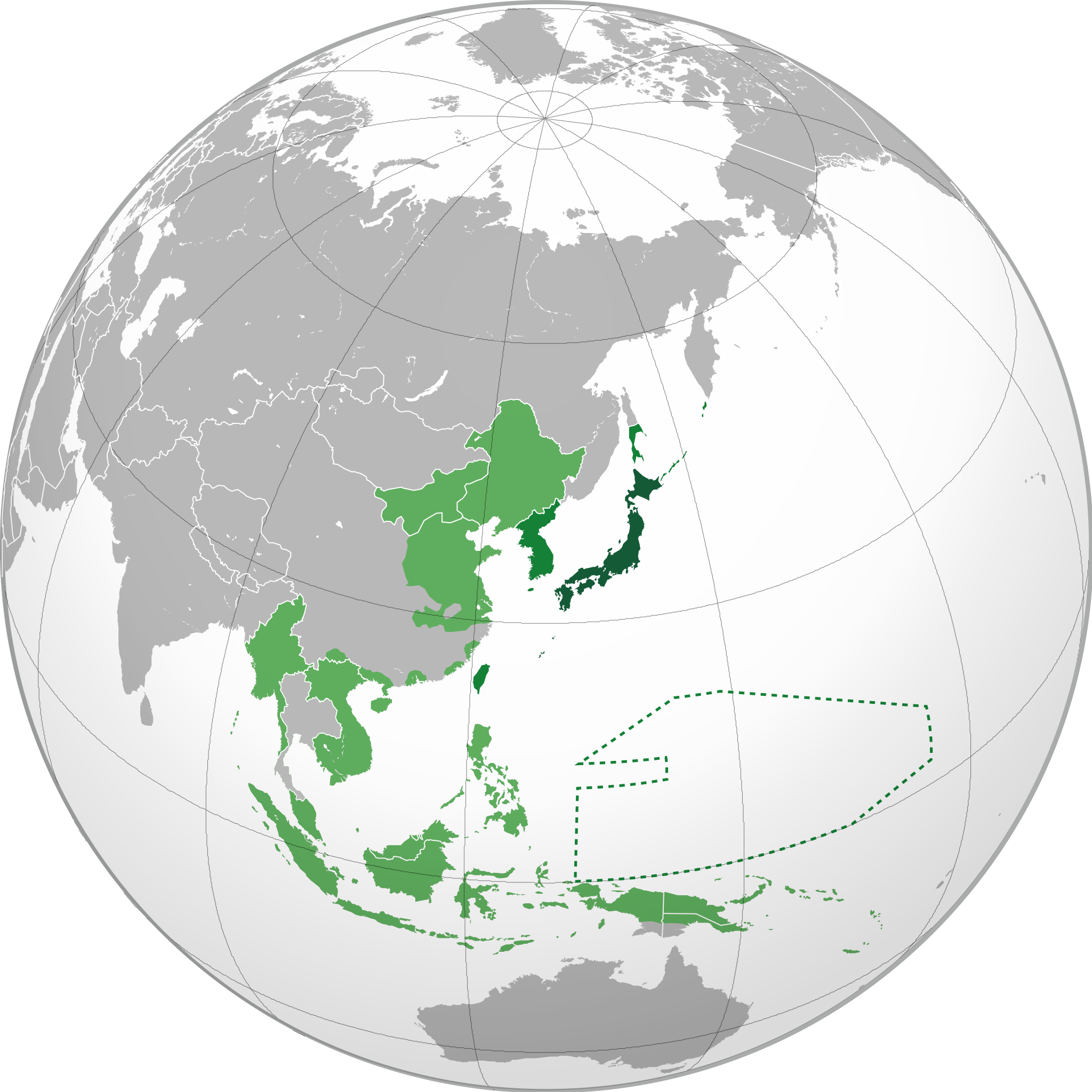Empire of Japan (1868–1947): Difference between revisions
More languages
More actions
Verda.Majo (talk | contribs) mNo edit summary Tag: Visual edit |
(Moved information on Unit 731 to it's own page.) |
||
| Line 3: | Line 3: | ||
The '''Empire of Japan''' was a country in [[East Asia]]. It existed from the Meiji Restoration in 1868 until the enactment of the post-[[Second World War|World War II]] 1947 constitution and subsequent formation of modern-day [[Japan]]. During the Second World War, Japan was a [[Fascism|fascist]] country and part of the Axis along with [[German Reich (1933–1945)|Nazi Germany]]. | The '''Empire of Japan''' was a country in [[East Asia]]. It existed from the Meiji Restoration in 1868 until the enactment of the post-[[Second World War|World War II]] 1947 constitution and subsequent formation of modern-day [[Japan]]. During the Second World War, Japan was a [[Fascism|fascist]] country and part of the Axis along with [[German Reich (1933–1945)|Nazi Germany]]. | ||
The memories of Japan's [[imperialism]], exemplified by events such as the [[Nanjing massacre]], the sexual exploitation of [[comfort women]] in various countries, criminal medical experimentation, [[Slavery|slave labor]], and other such atrocities still affect Japan's relations with other [[Asia|Asian]] countries in the present day.<ref name=":1" /> | The memories of Japan's [[imperialism]], exemplified by events such as the [[Nanjing massacre]], the sexual exploitation of [[comfort women]] in various countries, criminal medical experimentation, [[Slavery|slave labor]], human rights abuses in [[Unit 731|development unit 731]], and other such atrocities still affect Japan's relations with other [[Asia|Asian]] countries in the present day.<ref name=":1" /> | ||
[[Nippon Kaigi]], a far-right lobby group in modern Japan, holds that "Japan should be applauded for liberating much of East Asia from Western colonial powers; that the 1946–1948 Tokyo War Crimes tribunals were illegitimate; and that killings by Imperial Japanese troops during the 1937 Nanjing Massacre were exaggerated or fabricated" and that [[comfort women]] were not forced into sexual slavery. [[Shinzo Abe]], the former Japanese Prime Minister who was assassinated on July 8, 2022, had ties with Nippon Kaigi.<ref>Norihiro Kato (12 September 2014). [https://www.nytimes.com/2014/09/13/opinion/tea-party-politics-in-japan.html "Tea Party Politics in Japan"]. ''New York Times''. [https://web.archive.org/web/20220905014351/https://www.nytimes.com/2014/09/13/opinion/tea-party-politics-in-japan.html Archived] 2022-09-05.</ref> | [[Nippon Kaigi]], a far-right lobby group in modern Japan, holds that "Japan should be applauded for liberating much of East Asia from Western colonial powers; that the 1946–1948 Tokyo War Crimes tribunals were illegitimate; and that killings by Imperial Japanese troops during the 1937 Nanjing Massacre were exaggerated or fabricated" and that [[comfort women]] were not forced into sexual slavery. [[Shinzo Abe]], the former Japanese Prime Minister who was assassinated on July 8, 2022, had ties with Nippon Kaigi.<ref>Norihiro Kato (12 September 2014). [https://www.nytimes.com/2014/09/13/opinion/tea-party-politics-in-japan.html "Tea Party Politics in Japan"]. ''New York Times''. [https://web.archive.org/web/20220905014351/https://www.nytimes.com/2014/09/13/opinion/tea-party-politics-in-japan.html Archived] 2022-09-05.</ref> | ||
Revision as of 14:06, 8 September 2022
The Empire of Japan was a country in East Asia. It existed from the Meiji Restoration in 1868 until the enactment of the post-World War II 1947 constitution and subsequent formation of modern-day Japan. During the Second World War, Japan was a fascist country and part of the Axis along with Nazi Germany.
The memories of Japan's imperialism, exemplified by events such as the Nanjing massacre, the sexual exploitation of comfort women in various countries, criminal medical experimentation, slave labor, human rights abuses in development unit 731, and other such atrocities still affect Japan's relations with other Asian countries in the present day.[1]
Nippon Kaigi, a far-right lobby group in modern Japan, holds that "Japan should be applauded for liberating much of East Asia from Western colonial powers; that the 1946–1948 Tokyo War Crimes tribunals were illegitimate; and that killings by Imperial Japanese troops during the 1937 Nanjing Massacre were exaggerated or fabricated" and that comfort women were not forced into sexual slavery. Shinzo Abe, the former Japanese Prime Minister who was assassinated on July 8, 2022, had ties with Nippon Kaigi.[2]
History
Before 1868, Japan was ruled by samurai under the feudal Tokugawa Shogunate. The Meiji Restoration of 1868 returned power to the emperor and began the modernization of Japan. Japan annexed and colonized Korea in 1910. During the Russian Civil War, Japanese forces invaded parts of Russia both to gain territory and to stop the spread of communism. The Japanese state persecuted communists and anarchists in the 1920s.[3]
In the nineteenth century, Western powers had saddled non-Western states with a variety of unequal arrangements, from fixed tariffs and extraterritoriality to formal colonization. In the case of Japan, a treaty was signed between Japan and the U.S., which Japanese nationalists protested as being disadvantageous to Japan. Leading their list of goals was the need to strengthen the military in order to withstand future Western impositions. They studied the organizations and techniques of Western governments and militaries, and they modeled their own institutions on them. Thus the Meiji government was born in an imperialistic milieu, and their primary models were the world's leading imperialistic states.[4] According to Encyclopedia Britannica, "Achieving equality with the West was one of the primary goals of the Meiji leaders."[5] According to Peter J. Seybolt of the Center for Asian Studies at the University of Vermont, "In the 19th century, Britain, the United States and France, soon followed by Russia, Germany and other Western nations, forcefully 'opened' a reluctant East Asia to Western trade and religious proselytizing by imposing a series of 'unequal treaties'" and, after a period of internal turmoil, "the Japanese united as a nation determined to learn from the West techniques for 'strengthening the army and enriching the country.'"[1] According to Seybolt:
Within a remarkably short time the Japanese had acquired the power to compete with the West on its own terms, whereupon they took the initiative to "open" Korea, the most conservative of the three East Asian nations, and join Western nations in imposing unequal treaties on it. In 1894-95 Japan defeated China in a war to determine control of Korea, and a decade later it decisively defeated Russia in a war over exploitation rights in Korea and Manchuria in northeastern China. [...] Chinese historians estimate that more than 20 million of their compatriots died as a direct result of the war, and uncounted millions of others were injured. In the most notorious single incident of the war an estimated 150,000 to 350,000 Chinese men, women, and children were slaughtered in a frenzy of indiscriminate killing by Japanese troops when they entered Nanjing, then the capital of the Republic of China. The infamous Nanjing massacre was a calculated attempt by local Japanese commanders to terrorize the Chinese into capitulating. The effect was the opposite. Chinese resistance stiffened, and memories of the atrocity are still fresh.[1]

Early in the Meiji period, the Japanese government consolidated its hold on the peripheral islands of the Japanese archipelago. In the territory inhabited by the Ainu, the Meiji regime tried to wipe out markers of Ainu ethnicity (earrings and tattoos, for example) and prohibited the Ainu from practicing their religion or hunting in their ancestral hunting-grounds. In 1899, the state enacted the "Law for the Protection of Former Hokkaidō Aborigines," which removed land from communal control, thereby forcing the Ainu to become petty farmers. Japanese assimilation policies not only dispossessed the Ainu, they destroyed nearly all indicators of Ainu cultural and ethnic identity. The Japanese government also embarked on a policy of cultural assimilation in Okinawa, paying particular attention to discouraging the use of the native Okinawan language and enforcing the use of standard Japanese among schoolchildren. Eventually, leading Japanese intellectuals and government officials in the 1880s and 1890s began to support the idea of winning control over neighboring regions. Three factors were responsible for this drive: a nationalist desire for equality, desire for access to the raw materials and markets of East Asia (which could be lost if a Western power gained control of the regions first), and other strategic goals, and Japan eventually aimed to bring China and Korea under its control.[4] Between 1910 and 1945, Japan worked to wipe out Korean culture, language and history and took control over Korea's labor power and land.[6] At the height of its power in 1942, the Japanese Empire controlled Korea, Manchuria, and parts of China and Indonesia.[7]
References
- ↑ 1.0 1.1 1.2 Peter J. Seybolt. "China, Korea and Japan: Forgiveness and Mourning" Asia Society. Archived from the original on 2022-08-14.
- ↑ Norihiro Kato (12 September 2014). "Tea Party Politics in Japan". New York Times. Archived 2022-09-05.
- ↑ Tatiana Linkhoeva (2020-07-16). "Imperial Japan and the Russian Revolution" Jacobin. Archived from the original on 2022-06-22. Retrieved 2022-09-04.
- ↑ 4.0 4.1 Andrew Reed Hall. “Japanese Imperialism and Colonialism | Japan Module.” University of Pittsburgh.
- ↑ "Japan: The emergence of imperial Japan". Encyclopedia Britannica. Archived from the original.
- ↑ Erin Blakemore (July 28, 2020.). "How Japan Took Control of Korea" History.com.
- ↑ “Fragments of Empire: Effects of Japanese Imperialism in Korea, China, Japan, and Vietnam – Marlboro College Archives.” Emerson.edu.


